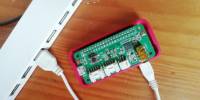Table of Contents
Respeaker
Basic preparation
apt install build-essential git raspberrypi-kernel-headers
Install driver
For some reason this installs an ARM64 toolchain on a 32-bit Raspberry Pi Zero along with a ton of other stuff that seems unrelated.
git clone https://github.com/HinTak/seeed-voicecard cd seeed-voicecard sudo ./install.sh
Installation will take quite some time.
Setup
Disable internal sound devices and reduce memory consumption.
/boot/config.txt:
# Enable audio (loads snd_bcm2835) #dtparam=audio=on # Enable DRM VC4 V3D driver #dtoverlay=vc4-kms-v3d #max_framebuffers=2 # Local gpu_mem=16 dtparam=spi=on
REBOOT
aplay -l && arecord -l
**** List of PLAYBACK Hardware Devices **** card 0: seeed2micvoicec [seeed-2mic-voicecard], device 0: bcm2835-i2s-wm8960-hifi wm8960-hifi-0 [bcm2835-i2s-wm8960-hifi wm8960-hifi-0] Subdevices: 1/1 Subdevice #0: subdevice #0 **** List of CAPTURE Hardware Devices **** card 0: seeed2micvoicec [seeed-2mic-voicecard], device 0: bcm2835-i2s-wm8960-hifi wm8960-hifi-0 [bcm2835-i2s-wm8960-hifi wm8960-hifi-0] Subdevices: 1/1 Subdevice #0: subdevice #0
Test
Install the Respeaker demo with picovoice 1.
The demo contains binary blobs of unknown origin.
sudo apt install python3-pip python3-pyaudio rehash pip3 install pvrespeakerdemo==1.1.3
Add $HOME/.local/bin to PATH
You can install Version 2 but it needs a LICENSE key whereas version 1 does not.



